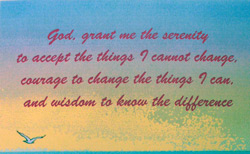

THERAPY
begin therapy
contact me
TOPICS
depression
anxiety/panic attacks
cope with flashbacks
anxiety & depression
anger management
blame-o-holics
addiction
dual diagnosis
grief & loss
grief suggestions
codependency 1
codependency 2
coda recovery
childhood trauma
on being a therapist
RESOURCES
Carl's Videos
Johari window
my child within
shame & guilt
fear of intimacy
reparent WC
shattered
serenity prayer
control/responsibility
empathy
taming the mind
mindfulness
stress management
spam of the mind
self-care
healthy conflict
assertiveness
healthy boundaries
meditation
mistaken beliefs
IQ vs. EQ
maturity/immaturity
happiness habits
Pollyanna thinking
basic human rights
helpful quotations
helpful books
helpful movies

Control and Responsibility:
The Boundaries in Our Minds
CONTROL: Many clients are stressed out from obsessively trying to control what they can't control while ignoring what they can control. They are exhausted from living their lives like a person who obsesses on wishing for sunshine while neglecting to bring an umbrella. You might not think this sounds like you - focusing on what you can't change while ignoring what you can - but this behavior pattern is more common than you might think.
Have you ever become stressed out trying to help a troubled loved one - a mother, father, husband, wife, child, or good friend - who did not want to be helped? Have you ever felt overwhelmed from obsessively trying to rescue a good friend with an addiction? Have you ever felt defeated and deflated from trying to persuade someone with a physical or mental illness to see a doctor? Have you ever felt distraught from trying to help a loved one in denial about being the victim of an abusive relationship? If so, then you probably have been trying to control what you can't control while ignoring what you can control.
Al-Anon is a support group for people who have been affected by someone else's alcoholism. Typically, a newcomer arrives at Al-Anon and says, "Tell me how to get my alcoholic to stop drinking." Al-Anon members reply, "We are sorry, but we can't do that. We can, however, reassure you that didn't cause the drinking, you can't control it, and you can't cure it. And if you keep coming to Al-Anon, you can learn how to take care of yourself in the face of your loved one's alcoholism."
Thus, the great benefit of Al-Anon is that it helps stressed-out family members and friends learn how to stop obsessing on what they can't control, the alcoholic, and begin focusing on what they can control, themselves. This may seem selfish, but it is not. It is just reality - we can not control another person, but we can take care of ourselves.
The
Serenity Prayer is an important
recitation at most 12-Step
meetings, such as Alcoholics Anonymous, Narcotics Anonymous, and Al-Anon.
This simple and profound prayer asks God or a Higher Power to give us
the serenity to accept what we can't change, the courage to change what
we can, and the wisdom to know the difference. By viewing
 any
situation through the wisdom of the Serenity Prayer, we can
find more effective solutions to problems by focusing our efforts on
what we can control.
any
situation through the wisdom of the Serenity Prayer, we can
find more effective solutions to problems by focusing our efforts on
what we can control.
We cannot control many things, such as the weather, the stock market, and, most importantly, other people. We have a much greater ability, however, of controlling our own choices and behaviors, which is why Al-Anon, Codependents Anonymous, and mental health professionals generally encourage individuals to focus on their own choices and behaviors rather than on those of others. So, when facing any difficult situation, remember to ask yourself, "What can I control and what can't I control?" Then focus your energies on what you can control. This is how we transform powerlessness into empowerment.
RESPONSIBILITY: Many clients are stressed out by feeling responsible for things they are not responsible for or could not possibly control. They are guilt-ridden from trying to fix everyone's problems and depleted from ignoring their own needs. Their lives are spent giving everyone else water while they are slowly dying of thirst. They are motivated by an addiction-like syndrome called codependency, whereby one focuses on the problems of others as a subconscious strategy to avoid dealing with one's own problems.
Do you have codependent tendencies? Is it difficult for you to say "no"? Do you feel like you must always be the peacemaker? Have you ever blamed yourself because you couldn't get a friend to stop being self-destructive? Have you ever felt guilty because of a stranger's misfortune even though you did not cause it? Are you more comfortable giving than receiving? Have you ever felt shame because of an adult child's irresponsible behavior? Are you unable to ask for what you want? Have you ever felt bad about yourself because of your spouse's abusive or inappropriate behaviors toward you? Have you ever felt it was your responsibility to fix your boyfriend's or girlfriend's problems? Do you think other people's needs and feelings are more important than your own? Have you ever felt guilty because you couldn't attend a funeral through no fault of your own? Do you easily become upset if someone is upset around you? Have you blamed yourself for your estranged spouse's neglectful behavior toward your children? If you said "yes" to any of these questions, then you probably feel over-responsible for others and most likely are neglecting your own needs. Codependents Anonymous and Al-Anon help their members learn to take responsibility for their own problems while allowing others to do the same.
So, what are we actually responsible for? We are responsible for our own behaviors, moods, choices, problems, attitudes, happiness, character defects, thoughts, feelings, hopes, dreams, mistakes, the way we treat others, and whether or not we allow others to abuse, manipulate, or mistreat us. We are not responsible for other people's choices, behaviors, bad decisions, addictions, the consequences of their choices, their hopes, dreams, character defects, thoughts, feelings, problems, attitudes, and moods. We are responsible for ourselves; we are not responsible for others. Does this mean we do not care about others? Of course not. It simply means we give others the respect of being responsible for their own lives, and we give ourselves the same respect of being responsible for our lives.
CONTROL AND RESPONSIBLITY: Good mental health requires that we focus our energies on changing what we can change and accepting what we can't change. We also must have clear boundaries in our minds as to what is our responsibility and what isn't our responsibility. The more clearly we understand control and responsibility, the more effectively we will manage our lives.
If you would like help in understanding what you can and can't control and what is and isn't your responsibility, then click on the photo below to see if online therapy might be right for you.
Below is Carl's 5-minute YouTube video of this article:
To follow my posts on Facebook, please click the Like and/or Share buttons below:
Click on the photo below to request online therapy..

for a new beginning...
Home / My Credentials / Counseling Philosophy / Online Therapy Risks & Benefits / Services & Fees / Confidentiality / Begin Therapy / In Crisis Now? / Contact Me / Carl's YouTube Videos / Sitemap
Copyright 2005-2022 Serenity Online Therapy
All Text and many photos by Carl Benedict